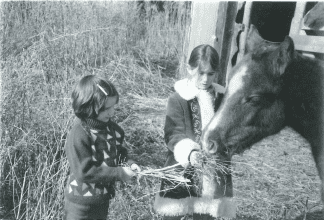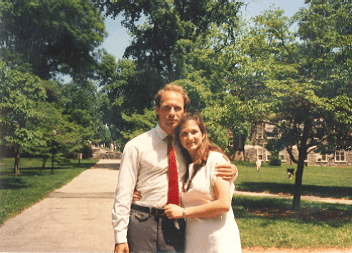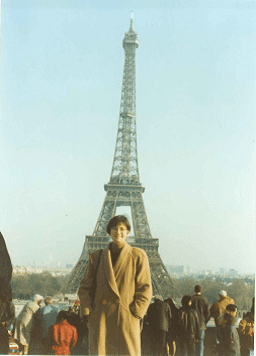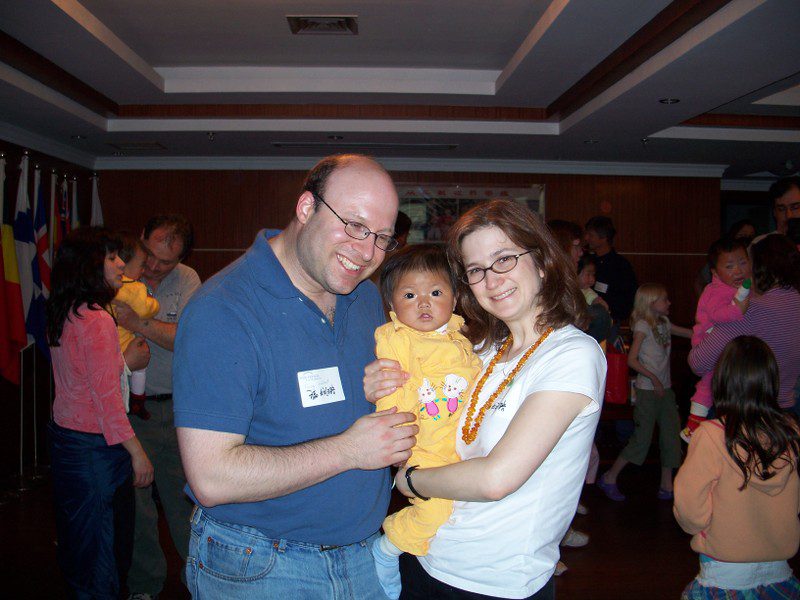Having grown up in Middle America in an Old World family, Jennifer Sartori has understandably been drawn to issues of Jewish identity and Jewish history. She was reared in Lincoln, Nebraska, a small city with about 2,000 Jews, making her acutely aware of being different. Her grandparents’ stories of fleeing Europe as the continent plunged into Nazism and a world war permeated her childhood. Both experiences have shaped Sartori’s teaching and scholarship during her 11 years at Northeastern as an academic specialist and Associate Director of Jewish Studies.
Sartori, who was born in Mt. Auburn Hospital in Cambridge in 1969, landed in Lincoln when her father joined the University of Nebraska’s physics department. Both her parents had earned academic degrees in Boston before moving to Lincoln, home to the state university and the state government. Sartori’s mother, who has a Ph.D. in French literature and a degree in library science, later became a reference librarian at the university.
In her K-6 elementary school, Sartori and her sister were the only Jews. “We were practically the only kids with brown hair,” Sartori says, noting that most of Lincoln’s about 150,000 citizens were of German and Czech ancestry with blonde-haired, blue-eyed children. “The problem was not hostility, but ignorance, a lack of any kind of understanding of Jewishness,” Sartori says. “We didn’t quite fit in.”
Sartori recalls “small things,” such as making red-and-green paper chains for a Christmas wreath in the first grade, and the high school’s German Club selling an advent calendar that marked the days to Christmas. And then there was the time her mother visited the school principal to complain about the advent wreath in the lobby of the public high school. “My mother had to go in and fight that battle and she shouldn’t have had to fight that battle,” Sartori says.
There were a few “more problematic episodes,” including a fellow high school student who “made a point of going around telling everyone they would go to hell if they didn’t believe in Jesus.” Sartori recalls, “I had the definite feeling of being on the outside.”
Her parents belonged to the city’s Reform congregation; Lincoln also had a conservative synagogue. Sartori was a member of National Federation of Temple Youth. But her primary sense of Jewish identity came from her parents’ history and from time spent with her European grandparents and their friends.
Sartori’s mother, Eva, was born in Bialystok, Poland, in 1939, just as World War II began with the German invasion of her home country. Sartori’s maternal grandfather, Leon, was a medical doctor and her grandmother, Cyla, was a pharmacist. Her grandfather made a “Jewish odyssey to get a medical degree, some training in Poland, some in Strasbourg, some in Ghent.” Her grandmother went to Prague and studied at Charles University. “They were wandering Jews in search of degrees,” Sartori explains.
With degrees in hand, Cyla and Leon returned to Poland. Sartori’s grandfather started a medical practice. The family managed to survive the Soviet occupation of Bialystok during the war’s first two years.
When the Germans invaded in 1941, her grandparents fled into the woods with their two babies, Sartori’s two-year-old mother and a one-year son. Other relatives were with them. The small band tried to join Polish partisans, who were willing to accept Sartori’s grandfather for his medical expertise, but not the women and children. So her grandfather stayed with the partisans and her grandmother fled with the children into the Soviet Union. Her grandmother barely survived in the wartime Soviet Union, at one point placing the children in an orphanage because she couldn’t care for them.
Miraculously, her grandparents, mother and uncle all survived the war and managed to find one other. The family stayed in Poland for about six months but the “level of anti-Semitism was so high” that they decided to go to France in 1946. “France took them in, they had tremendous gratitude to France,” Sartori explains.
The family would have remained had they been able to become French citizens. Unable to participate fully in French society, they accepted a relative’s offer to sponsor them to come to the United States. They arrived in the early 1950s.
Sartori’s father, Leo, had an equally European story. He was born in Italy in 1929. His parents, Michael and Elvira, had left Kishinev in what was then part of the Soviet Union because they couldn’t attend medical school there. Her grandfather became a dentist in Italy and the family led a comfortable life.
In 1938, their lives changed when Italy adopted racial laws that barred Jews from public life, followed by a 1939 law that prevented Jews from practicing medicine except for treating other Jews. That year Sartori’s father was sent to visit his grandparents, who were living in London. He stayed. His parents arrived in England the following year. Soon thereafter, the Sartori family immigrated to the United States. Perhaps as a nod to their life in Italy, they adopted an Italian last name once here, swapping their Yiddish name that meant “tailor” for the Italian word for tailor, “sartori”.
Both Sartori’s grandfathers retrained to practice medicine and dentistry in what became their home states of New York and New Jersey.
This family history was very present in Sartori’s childhood. “It is said there are two kinds of families: those who can’t talk about the Holocaust, and those who can’t talk about anything else,” Sartori says. “Mine is the latter, especially on my mother’s side. It was part of everyday conversation. I don’t ever remember not knowing about the Holocaust. It never seemed to occur to them that they shouldn’t talk about those things around children.”
Sartori’s grandparents were not survivors in the sense of surviving concentration or extermination campus. “In my family, those who survived were not in camps,” Sartori explains. Yet a “sense of insecurity” dominated her grandparents’ and parents’ existence. Her grandparents surrounded themselves with those who had gone through the same harrowing experiences.
Visiting them, first in the northeast and then in Florida, Sartori entered another world. “There was very much an Old World feel to their group,” Sartori recalls. “Everybody had an accent, everybody spoke five or six languages; everybody had some amazing survival story.”
Leaving Nebraska for Haverford College in Pennsylvania, Sartori didn’t necessarily set out to study the world of her parents or her own ethnic isolation. She wasn’t sure whether she wanted to study history or political science. But she soon gravitated toward history, and Jewish history in particular. Although the small college didn’t offer separate courses on Jewish history, Sartori often found herself choosing Jewish topics for her papers. In a course on Women in the Middle Ages, for example, she decided to focus on the experience of Jewish women.
Sartori graduated from Haverford with high honors in history in 1991 and decided to pursue a Ph.D. in history.
Again Sartori didn’t set out to study Jewish history. “I went to Emory to study French history, particularly French women in early modern history,” Sartori recalls. In fact, Emory didn’t have much in terms of Jewish history. Sartori’s experience at Emory mirrored her college days. She didn’t take courses on Jewish history and yet found herself often writing her papers on Jewish topics. She wrote on Jewish women in the French resistance during World War II, for example, and 19th-century English novels written by Jews.
“There wasn’t a Jewish historian at Emory so I had to be creative,” Sartori explains. Sartori did a directed study with Deborah Lipstadt, a professor in the religion department who had just joined the Emory faculty. Lipstadt is a well-known historian of the Holocaust.
Sartori acknowledges that she missed out in some ways by not choosing a Jewish Studies program. “But I also learned how to be self taught,” she says.
She decided to write her dissertation on the education of Jewish girls in 19th Century France.
During her Emory years, she became reacquainted with Barry Gilbert, whom she had been friends with at Haverford. Sartori was in London on a fellowship, Gilbert, a philosophy Ph.D. student, was in Vienna. They reunited in Paris and married three years later, in 2000.
Gilbert obtained a two-year job teaching at Trinity College in Hartford. The couple moved there in 1999. Gilbert taught while Sartori worked on her dissertation. Six months later, Sartori took a job at the Jewish Women’s Archive (JWA) in Brookline. The archive, which was founded in 1995, is a national non-profit “devoted to making known the stories, struggles, and achievements of Jewish women in North America and beyond.”
At the archive, Sartori conducted historical research and helped develop educational and online exhibits. She eventually directed the archive’s educational initiatives. For the first 18 months, Sartori lived in Hartford and commuted to Brookline two days a week. With Gilbert’s appointment coming to an end, the couple moved to Brookline in the summer of 2001. Gilbert now works in finance at LPL Financial in Boston.
Although Sartori enjoyed her work at the archive, she realized the full-time commitment was making it difficult for her to finish her dissertation. So in December 2003 she left to write. She completed her dissertation, “‘Our religious future’: Girls’ Education and Jewish Identity in Nineteenth-Century France,” receiving her Ph.D. in 2004.
That same year, she saw an advertisement for a job at Northeastern, teaching and helping to administer the university’s Jewish Studies program. “It seemed like a good fit,” Sartori says. “I had the academic background and training to teach and from working at JWA I had experience with administrative work and project management.”
Northeastern’s Jewish Studies director, Debra Kaufman, hired Sartori as one of her last acts before retiring. Sartori has worked with subsequent Jewish Studies directors, James Ross and Lori Lefkovitz. Sartori, who came in as Assistant Academic Specialist, added the title of Associate Director in 2006.
It has been a good fit. She has liked teaching at Northeastern. “In a lot of ways, it’s very refreshing. Students don’t take their education for granted,” she says, noting that Northeastern’s history as a place for first-generation college students and its continuing reliance on co-op education affect the students’ attitude. “The students force you to be able to articulate why learning is important. They want to know the connection between what they’re learning and real life,” Sartori explains. “It’s a positive thing for instructors to be forced to articulate that.”
Sartori also appreciates that her Jewish Studies classes often include significant numbers of non-Jews. “I like to have many non-Jewish students to introduce them to Jewishness or the Jewish experience,” she says. “Jews are an important piece of the multi-cultural canvas. In America we really focus so much on race – and I don’t want to minimize that – but there are so many other, different forms of diversity. Defining Jews out of that, which there has been a tendency to do, is just wrong on the historical record.”
Having many non-Jews in Jewish Studies classes does present a challenge. “Some students have eight to 10 years of Jewish education, and some come in with absolutely nothing,” Sartori says. “Some students have a very personal emotional engagement with material, and others study it as an academic subject. You have to teach multiple constituencies.”
Sartori’s teaching has reflected her interest in both Jewish identity and Jewish history. She has taught European Jewish History and American Jewish History. She has also taught “Women in Jewish Culture”, “Race, Religion, Ethnicity: The Example of Jewishness,” and “Exploring Adoption: Family, Kinship & Identity in Contemporary America.”
The last course reflects a turn in Sartori’s personal life that has affected her scholarship as well. In 2007, she and her husband adopted a nine-month old baby in China, now named Celia. Sartori didn’t find much in either the academic or popular literature on the particular challenges of Jewish adoption. So, along with Jayne Guberman, a former colleague from the Jewish Women’s Archive, she decided to study Jewish identity in adoptive Jewish families. Guberman, an independent scholar and oral historian, has one biological daughter and one adopted daughter.
“I have always been interested in the shaping of modern Jewish identity,” Sartori explains. Her dissertation on the education of Jewish girls in France focused on “how Jewish elements and French elements were coming into play at the time.” Sartori says her current work addresses “in a very different context the same fundamental questions, although it’s much more personal of course.”
To answer those questions, Sartori and Guberman have surveyed adoptive Jewish parents and are now conducting oral histories of adult adoptees raised in Jewish families. Their approach has been more sociological than historical, requiring Sartori to shift emphasis somewhat. She sees that as very much in line with the Jewish Studies approach, which is multidisciplinary. Sartori has written several academic papers, as well as having spoken at academic conferences and to community groups. She and Guberman are deciding whether they want to write an academic book or a popular book on the topic – or both.
“The vast majority of children adopted into Jewish families today were not born to Jewish birth parents and so bring with them another identity,” Sartori says. “At a time when Jews are concerned about Jewish continuity, about being a tiny minority in the United States, these challenges of blended identities can be very complicated.”
Sartori wants to address the identity concerns that have preoccupied her since her Middle American childhood, as well as help other adoptive parents. “We don’t just want to be talking to academics,” Sartori says. “A lot of the original motivation was to help many adoptive families for whom this is a very complicated experience and a very lonely experience because people don’t talk about it.”
In her teaching and research, Sartori contributes to Northeastern expertise in the Jewish historical experience in Europe and America and in the complexities of Jewish identity. An active member of the Northeastern faculty, she also administers a particularly full program of co-curricular events in Jewish Studies, co-teaches the capstone module for minors, and advises Jewish Studies students.
Read the rest of the Fall 2015 Haverim Newsletter here.







